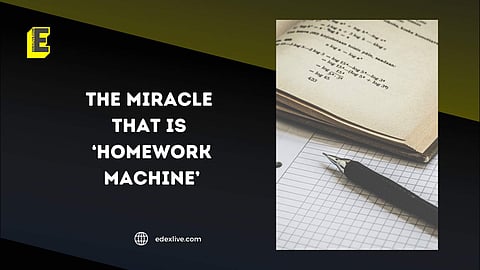

If there's one thing that students, especially those in the professional stream, find bothersome is cumbersome writing assignments. Fed up with what is seen as a byproduct of rote learning, a fourth-year engineering student of Cheruthuruthy Jyothi Engineering College has come up with a machine that makes light work of the time-consuming writing process. Devadath PR's 'homework machine' is finding resonance with the student community not just in the state but also nationally, stated a report in The New Indian Express.
"Writing assignments were taking up most of my time, which I could have been spending researching or studying. It was becoming very tedious. So, one day when I was asked to submit an assignment, I thought of developing a machine that would do the job for me," said Devadath.
And why not? he adds. "All students do with assignments is copy matter that is available in books and on the internet. Nothing is original," says the robotics engineering student who is now planning to commercialise his invention.
His first attempt was a failure after a teacher realised that the assignment that he had submitted was a printout. "Following the detection the lab teacher asked me to resubmit in writing the 100-page assignment. This is when I decided to come up with something else. Starting with software, I set out to create a machine to efficiently and effectively do your homework without getting caught," says Devadath, from Thrissur.
Explaining the way he came up with the device, Devadath says, "The software needs to know your hand to generate the text in what resembles one's own handwriting. Your handwriting strokes are recorded and saved in a format suitable for the Gcode generation Python script to process," he adds. If unnatural regularity and neatness of the machine-written text gave him away the first time, he tried to overcome it by recording multiple versions of each character in his handwriting.
"It was recorded using Inkscape's pen tool. Each letter was painstakingly converted to Gcode and all characters' Gcode was combined into a file. The Gcode generation script uses this file as a reference for my handwriting," says Devadath, whose creation won first prize at the techfest competition organised at his college.
This time, it worked! "The teacher ended up signing off on my lab record as the end product was entirely different from what I had presented prior," he says. Devadath, who has been receiving enquiries regarding the machine, is now planning to come out with a commercial version of his prototype, which cost him Rs 20,000 to develop. "The second version of the machine -- which can also integrate ChatGPT — will be made available for Rs 10,000," he adds. An automated kitchen is next in the pipeline.
